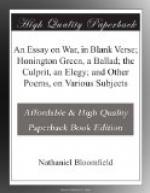ESSAY ON WAR
[War for room required by encreased Population.—With Arts of Use and Comfort spring those of War.—Blessings of the Infant State of Society.—Peace cannot last beyond the Infancy of Society.—War defined to preserve the equilibrium of Population.—War between hords of emigrating Stranger Nations.—Invasions on account of violated Women.—Love the strongest and most natural cause of War.—Violence of conflicting Passions at sight of an Enemy.—Solitary wounded Combatant amid the Dying and Dead.—Female Friends seeking for Dead or Wounded Relatives.—Morning after the Battle—Sympathy—Compassion.—Long remembrance of the Horrors of War.—Gunpowder; it’s tremendous effects.—Gunpowder, a humane discovery.—Castles &c. proofs of the continued prevalence of War.—Men quit a peaceful Country to seek War abroad.—History full of War.—Slavish Peace more cruel and more horrid than War.—Obligations of Peace to the active Virtues of War.—Havock of Peace more shocking than that of War.—War between Man and the rest of the animal Creation.—War of the Elements and natural Powers.—Recapitulation.... Conclusion.]
* * * * *
Man’s sad necessity, destructive War,
Sweeps to the grave the surplus of his sons,
Where’er the kindly clime and soil invite
To Love; and multiply the Human Race.
Around the World, in every happier spot
Where Earth spontaneous gives nutritious fruits.
Her softest verdure courting human feet,
And mossy grot’s, beneath protecting shades,
The Stranger’s envy, the Possessor’s pride;
There, as increasing numbers throng each bower.
Frequent and fatal rivalships arise;
And ruthless War erects his hideous crest.
Soon as Appropriation’s iron hand
Assays to grasp the Produce of the Earth;
And youths assert hereditary power,
Propriety exclusive, and in arms
League to defend their patrimonial rights,
Indisputable claim of Fruits and Fields
Contending, oft their massive clubs they raise
Against each other’s life: often, alas,
The needy cravings of the unportion’d poor
Provoke their jealous wrath; relentlessly
Tenacious of their store, they shut him out,
’Midst desart Famine, and ferocious Beasts,
To guard his life and till the steril soil;
And thus extend the range of human feet.
Still as Experience, in her tardy school,
Instructs the Shepherd and the Husbandman
To great increase their flocks and herds to rear,
To till the ground, and plant the fruitful tree
In slow progression rising into use,
Nurtur’d by Her the infant Arts appear.
While sage Experience thus teaches Man
The useful and the pleasant Arts of Life,
She in harsh lectures, in the frequent broil,
Enjoins her Pupil still to cultivate
The fatal, necessary Art of War.
The Artizan, who from metallic ores
Forms the sharp implements to dress the glebe,




